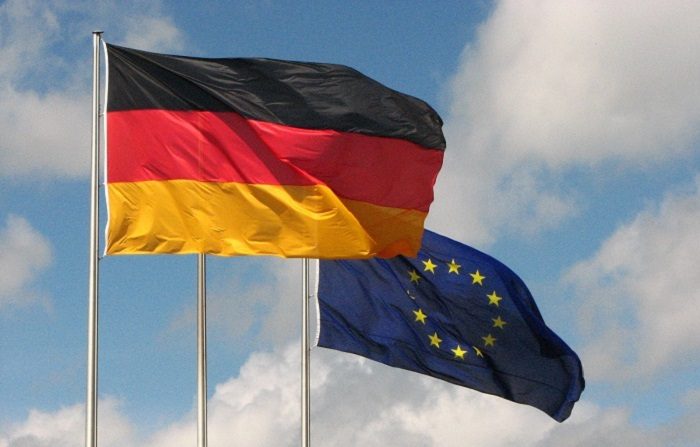
Since the onset of the sovereign debt crisis engulfing the EU’s common currency, the Euro, complaints about German dominance in EU decision-making have been commonplace, particularly from the political left, most notably from Greece’s Syriza party and Podemos in Spain. The refugee crisis that has shaken the Continent since 2015 has added corresponding cries about German dominance from the hard right. If, for the left, Germany was too insistent on fiscal retrenchment in the Eurozone, the right insists that Germany has been too lenient with respect to those coming to Europe seeking safety from war and terror at home. In the French presidential elections, Germany finds itself heavily assailed by both Jean-Luc Mélenchon from the left, and Marine Le Pen from the right. In countries as diverse in political orientation as Poland, Austria, and Greece, anti-German sentiment has also come to play a prominent role in political discourse. In this context, the British exit from the EU comes at an inconvenient time for the German government. Brexit poses a threat to the Union, not primarily because of the British departure, but because it reinforces existing power relations within the Union. Paradoxically, the biggest danger for Germany is to profit too much from Brexit.
Germany has had a good crisis. In comparison to its neighbours, it survived the economic and financial crisis without serious damage. Germany surpassed its 2008 pre-crisis GDP level in 2011, a feat that the Eurozone as a whole accomplished only by 2016. Simultaneously, the Euro crisis elevated German foreign-policy leverage to a level not seen since the birth of the Federal Republic in 1949. The German position has now become so dominant that few commentators recall how in the early days of the crisis, this was not so. In 2010 and 2011, the word ‘Merkozy’ gained proverbial currency in European newspapers, highlighting how Nicholas Sarkozy and Angela Merkel sought to solve the Euro crisis as a Franco-German tandem. Only in 2012, following the victory of Francois Hollande in the French presidential elections, and the ensuing French vacation from international politics, did Germany acquire its predominant status in Europe.
For the last five years, the German government has taken the lead in solving Europe’s crises. With Britain departing from the Union, the EU finds itself in a position where everything points to a reinforcement of German dominance. Not only does Brexit mean that a major potential counterweight to Berlin is leaving the playing field. More crucially, the ensuing exit negotiations will require a high degree of coordination from member states and will absorb every bit of dispensable political attention. European leaders, therefore, find themselves in a conundrum where they know that the question of German predominance needs to be addressed (since anti-German feelings are on the rise on both the hard left and right) and yet also know that Brexit means that there is no conceivable way of doing so in the immediate future. The absence of political majorities for institutional reforms – in whatever direction – adds to this problem.
The German government now finds itself in a position where they cannot leave the stage without creating a dangerous power vacuum. And yet they are also aware that they need to reduce their perceived power and influence to avoid feeding into growing anti-German sentiments across the continent. During the negotiations over Brexit, there is the additional danger that Germany might end up profiting from Brexit if banks end up shifting operations from London to Frankfurt. While German public opinion has been largely jubilant about this prospect, this poses a political threat to Germany. Given that the financial sector serves as a symbol of financial exploitation on both the radical right and left, it would be toxic for Germany’s position in Europe if radical minds succeed in adding outrage at perceived financial and economic domination by Frankfurt to existing complaints about political domination by Berlin. Counterintuitively, in the Brexit negotiations, Germany has an interest in ensuring that the financial industry remains in London to ensure a degree of balance in Europe. Radical movements throughout Europe would be boosted if Germany were to economically profit from punishing Britain for its departure.
Currently, thanks to its response to the refugee crisis, Germany is enjoying a boost of legitimacy from the centre to the left in Europe. While this is a good sign, it is not possible to lead the continent based on support from only a segment of the population. Given the impossibility of immediate changes to the architecture of European politics, the German government needs to pursue a European ‘grand bargain’ to stem radical anti-German movements on either side of the political spectrum. First, for Eastern Europe, there needs to be a credible offer of support against security threats from Russia, recognising that even if economics may have been the reason why Eastern European states joined the EU in 2004, security is the reason why they are still in it. Second, Berlin needs to ensure a rebalancing of European politics by increasing the position of Southern Europe while continuing to act as a representative of all northern European countries. Only by helping to put together some form of coalition of diverging forces can German foreign policy address the challenge that has arisen as a consequence of the British decision to exit the EU.
Further Reading on E-International Relations
- Post-Brexit EU Defence Policy: Is Germany Leading towards a European Army?
- The Days of May (Again): What Happens to Brexit Now?
- Germany and the New Global Order: The Country’s Power Resources Reassessed
- In Varietate Concordia: How Path Dependency Affects the Brexit Negotiations
- Opinion – One Year In, Germany’s Traffic Light Coalition Already Looks Overwhelmed
- Will Brexit Happen?